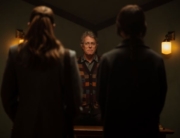
Nicole Kidman and Matthew Goode in STOKER (Macall Polay/Fox Searchlight)
Stoker starts right off steeped in tragedy—an upper-middle class woman, Evelyn Stoker (Nicole Kidman), becomes widowed when her husband dies in a car crash, and an 18-year-old girl, black-haired and pale-faced India (Mia Wasikowska), is without a father. At the funeral, a man appears, Uncle Charlie, the deceased’s brother. India has never met him, and has been told over the years that Charlie has been traveling the world. He comes to stay with the grieving mother and daughter at their Connecticut estate, and at first look, he’s a very handsome man with cooking skills, a cool car, and a kind of oily sex appeal.
But what’s up with Uncle Charlie? Why does India feel uneasy about him? Why does Evelyn take a liking towards him, and doesn’t really comprehend when India asks why she isn’t really grieving for her dead husband. As it turns out, not all is quite right with dear ol’ Chuck—an old housekeeper seemingly has just left and no one knows where she has gone, while a relative, Aunt Gwendolyn (Jacki Weaver, given more to do here in her brief screen time than in Silver Linings Playbook, but I digress) also goes missing. Oh, and India really shouldn’t stick her head down in the basement freezer, either.
Stoker is the first U.S. feature film from possibly South Korea’s premier director, Park Chan-wook. Based on his earlier films—Lady Vengeance; I’m a Cyborg, but That’s Ok; Thirst; and his quintessential film thus far, the revenge tragedy Oldboy. He’s a director with a tremendous amount of skill at weaving story and character seamlessly, scene to scene, hell, shot to shot, with a fairly twisted sensibility. Stoker is no exception, and it’s one of his best films yet.
To anyone who has seen Alfred Hitchcock’s Shadow of a Doubt, the comparison can’t be any clearer: a seemingly all-American girl has to contend with a family member who may be a murderer. But for me anyway, it’s like the comparison of, say, Battle Royale to The Hunter Games. It starts and stops with the bare bones of the same premise, but in its execution of scenes, tone, and characters, it’s all quite different. And while Joseph Cotten in his Uncle Charlie role possibly has more dimension, Matthew Goode brings this placid but truly compelling person to life, a seducer with almost soulless eyes, who at times seems like an apparition.
For example of the difference between a Hitchcock thriller from Production Code-era Hollywood and Park’s 2013 effort, look no further than in one of the key sequences in which India is practicing on the piano and Uncle Charlie sits down beside her. He doesn’t do anything at first, and she tries to ignore him. Then he starts playing along with her. It’s a duet, but it’s more than that. It becomes a full-on course in seduction, but through music and body movement, and the heightened suggestions mount. That the music is an intense Philip Glass-style scoring via Clint Mansell ups the ante.
So, yeah, there’s a little more than implied incest, but so what? I can imagine some being turned off by Park’s style, which at times moves along like butter. But yes, shots linger a bit longer than you might be used to. And the whole first act, maybe the whole first half, is so tightly wound up with characters holding back, or Wasikowska and Goode exchanging looks, that you’re just itching to see when things are going to finally explode. Park triumphs in pulling off this powder keg of a suspense film.
And it makes you squirm, but that’s the idea. Some scenes made me do so more than in any film in the past few years. It helps, too, that Wasikowska is brilliant at conveying her character’s dilemma: will she stay on the side of good or go on the side of her uncle, which would lead to violence and death and other such madness? Oh, and there’s Nicole Kidman, too, and how the movie almost becomes a… well, I don’t want to spoil too much, do I?
Stoker prods you on as it builds through its twists and turns, and by the end I felt transfused into this world of black dresses, white walls, and cold stares that kill.






Leave A Comment